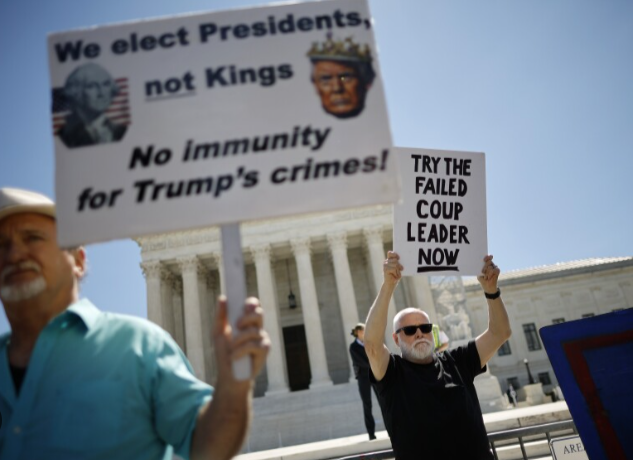Introduction
The presidential immunity in the united states Clause appears in two key locations in the U.S. Constitution: Article IV, Section 2, and the Fourteenth Amendment. Its purpose is to ensure that states do not discriminate against citizens of other states regarding fundamental rights, fostering unity among the states and maintaining the integrity of the nation. This principle is crucial for both historical and modern interpretations of constitutional law, particularly in the context of civil rights and economic integration.

Article IV, Section 2: Unifying the States
Text of the Clause
Article IV, Section 2, Clause 1 of the U.S. Constitution states: “The Citizens of each State shall be entitled to all Privileges and Immunities of Citizens in the several States.”
Historical Background
The Privileges and Immunities Clause in Article IV aimed to unite the disparate states into a cohesive nation. The precursor to this clause can be found in the Articles of Confederation, which contained a more verbose and somewhat unclear provision intended to ensure mutual friendship and free movement among the states. During the Constitutional Convention, the current, more streamlined clause was adopted with minimal debate, indicating a broad consensus on its importance and intent.
Judicial Interpretation and Theories
Over time, courts have proposed and discarded several theories regarding the purpose of the clause. The Supreme Court ultimately settled on a narrow interpretation that forbids states from discriminating against citizens of other states in favor of their own, ensuring equal treatment in matters of fundamental rights and economic activities essential to the nation’s unity. This interpretation emphasizes the clause’s role in maintaining the vitality of the Union by preventing states from enacting laws that unduly burden or discriminate against out-of-state citizens.
The Fourteenth Amendment: Expanding Rights
Context and Purpose
The Fourteenth Amendment, ratified in 1868, introduced another layer to the concept of privileges and immunities. It was primarily aimed at addressing the injustices faced by formerly enslaved people and ensuring that all citizens, regardless of race, were afforded equal protection under the law. The Privileges or Immunities Clause of the Fourteenth Amendment reads: “No State shall make or enforce any law which shall abridge the privileges or immunities of citizens of the United States.”
Judicial Interpretation and Application
While the Supreme Court has historically given a narrow interpretation to this clause, it remains a cornerstone for understanding and enforcing civil rights. Initially, the Court’s decisions limited the clause’s impact, focusing instead on the Equal Protection and Due Process Clauses to address issues of racial discrimination and other civil rights concerns. However, the inclusion of the clause in the Fourteenth Amendment underscores the fundamental idea that certain rights are inherent to national citizenship and must be protected against state infringement.
Privileges and Immunities in Practice
Economic Rights and Equal Treatment
The Clause ensures that citizens of one state can engage in fundamental economic activities in any other state without facing discriminatory practices. This includes pursuing common callings, owning property, and accessing the courts. For example, in Toomer v. Witsell, the Supreme Court struck down discriminatory license fees for non-resident shrimpers, emphasizing that commercial activities fall under the protection of the Clause.
Access to Courts
One of the essential privileges protected under the Clause is the right to sue and defend oneself in the courts of any state. States must allow non-residents access to their courts on terms that are reasonable and adequate, though not necessarily identical to those for residents. This ensures that non-residents can enforce their rights and seek justice across state lines.
Taxation and Economic Discrimination
States must exercise their taxing powers without substantial discrimination against non-residents. The Supreme Court has struck down state laws that impose heavier taxes on non-residents for conducting business or earning income within the state. However, some distinctions are allowed if they are justified by a substantial reason and bear a close relationship to that reason, ensuring overall fairness in taxation practices.
The Privileges and Immunities Clause Today
Modern Interpretations
- Recent cases emphasize that courts closely tie the interpretation of the Clause to the maintenance of the Union. They prohibit distinctions between residents and non-residents that hinder the formation or development of a single national entity. While the Clause initially aimed to create an economic union, it also protects noneconomic interests related to the unity and vitality of the nation.
Ongoing Challenges
- The Clause continues to play a crucial role in ensuring that states do not enact laws that discriminate against non-residents in ways that would undermine the nation’s unity. Whether in the context of access to public benefits, the right to engage in professional activities, or fair taxation practices, the Clause remains a key protector of individual rights and a unified national economy.
Note
The Privileges and Immunities Clause, both in Article IV and the Fourteenth Amendment, is a foundational element of the U.S. Constitution designed to prevent discriminatory practices by states against citizens of other states. Its primary purpose is to foster unity and ensure equal treatment regarding fundamental rights and economic activities. While its interpretation has evolved, the Clause remains integral to maintaining the nation’s cohesiveness and protecting individual rights across state lines
latest update
Supreme Court Ruling on Presidential Immunity Sparks Strong Reactions. In a landmark decision, the U.S. Supreme Court has ruled in a 6-3 vote to grant former presidents absolute immunity from prosecution for their official acts. This historic ruling has ignited a wave of reactions from political figures and commentators, including a stern response from President Joe Biden.
Key Points from the Supreme Court Decision
- Official vs. Unofficial Acts:
- Official Acts: These are actions taken by the president as part of their constitutional duties. The Supreme Court ruled that presidents have immunity from prosecution for these acts.
- Unofficial Acts: Actions taken outside the scope of presidential duties do not enjoy the same immunity.
- Impact on Trump’s Legal Cases:
- The decision represents a significant legal win for Donald Trump, as it raises the bar for bringing criminal charges against any president for their official actions.
- This ruling is a setback for Special Counsel Jack Smith’s federal election interference case and potentially impacts the classified documents case against Trump.
Biden’s Response: A Dangerous Precedent
- Biden criticized the ruling as part of a broader trend by the Supreme Court to undermine long-established legal principles. He warned that this new precedent could dangerously expand the power of the presidency, including the potential for future abuses of power.
The Political Implications
- In his speech, President Biden expressed deep concerns about the implications of the Supreme Court’s ruling. He emphasized that:
- The decision could lead to a situation where a president’s actions are no longer constrained by law, as long as they can be framed as part of their official duties.
- This fundamentally alters the principle that no one, including the president, is above the law.
- Journalist Ira Spitzer, reporting from San Francisco, noted that Biden’s speech aimed to address the ruling and shift the narrative away from his recent debate performance, which had faced widespread criticism. Biden’s strong and composed reaction aims to give American voters a stark contrast between his leadership style and that of former President Donald Trump.
- Spitzer noted that Trump, who appointed three of the current Supreme Court justices, has praised the ruling as a victory for democracy. Trump has been vocal in his opposition to the various criminal charges he faces, and this ruling provides significant support to his claims.
Trump’s Reaction
- As expected, Trump celebrated the Supreme Court decision. He called it a “big win for democracy” and saw it as validation against the criminal charges leveled against him. Trump has faced multiple legal challenges, including his alleged attempts to subvert the 2020 election, and this ruling undermines the potential for prosecution related to his official acts as president.
Expert Analysis
- Presidential historian and lawyer Jim Robenalt shared his insights, emphasizing the unprecedented nature of the ruling. He echoed Biden’s concerns, stating that this decision could embolden Trump if he were to return to the Oval Office. Robenalt highlighted that the ruling grants presidents a level of immunity that someone with a track record of seeking retribution against political enemies could dangerously exploit.
- Robenalt highlighted a dissent by Justice Ketanji Brown Jackson, who warned of hypothetical scenarios where a president could engage in egregious acts, such as ordering assassinations or instigating coups, and still be immune from prosecution. This dissent underscores the potential risks posed by the ruling.
- The recent Supreme Court decision on presidential immunity has created a significant shift in the legal landscape regarding the extent of protections afforded to sitting presidents. The Court ruled along ideological lines that President Biden has immunity for official acts conducted as president but does not enjoy such immunity for unofficial acts. This ruling has far-reaching implications, particularly for ongoing legal proceedings involving former President Donald Trump.
Broader Implications for U.S. Democracy
- The ruling has significant implications for the balance of power within the U.S. government. It challenges the delicate separation of powers among the executive, legislative, and judicial branches. By granting the president such broad immunity, the Supreme Court has shifted the balance, potentially allowing for actions that could undermine the rule of law.
- The decision is likely to spark extensive debate and analysis in the coming days, as political leaders and legal experts grapple with its ramifications. The future of U.S. democracy and the integrity of its legal system may be profoundly affected by this controversial ruling.
- As the nation moves forward, the implications of this Supreme Court decision will undoubtedly play a central role in the upcoming presidential campaign. which further intensifying the already heated political landscape.
Political and Legal Reactions
- Democrats: Many Democrats, including high-profile figures like Nancy Pelosi and Alexandria Ocasio-Cortez, have expressed outrage.
- Republicans: On the other hand, Trump and his allies are celebrating the ruling as a vindication and a victory for the rule of law.
Legal Analysis and Future Implications
- Legal experts are now closely examining how lower courts will apply this decision. They will have to distinguish between Trump’s official and unofficial actions during his presidency, particularly in relation to the January 6th insurrection and other charges.
- The presumption of official conduct as outlined by the Supreme Court places the burden on the government to prove otherwise. This could significantly complicate and delay legal proceedings against Trump. Unlikely that there will be a trial before the upcoming election.
Conclusion
The Supreme Court’s decision on presidential immunity in the United States marks a pivotal moment in American jurisprudence. Which has substantial consequences for the balance of power and the accountability of the executive branch. As the nation processes this ruling, political and legal battles are intensifying, shaping the landscape leading up to the next presidential election
